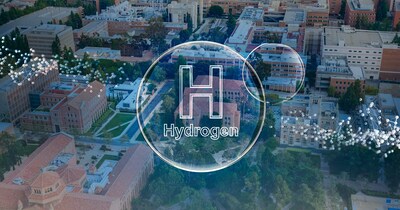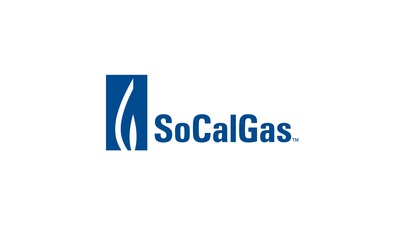The technology developed by UCLA with support from the California Energy Commission (CEC), and if approved, potentially by SoCalGas' Research, Development, and Demonstration Program, is part of one of 100 applications selected among 3,000 worldwide to be showcased at the Conference of Parties.
LOS ANGELES, Nov. 30, 2023 /PRNewswire/ -- Southern California Gas Company (SoCalGas) announced today that an innovative technology developed by UCLA researchers with potential project support from SoCalGas if approved by the California Public Utility Commission (CPUC), is currently on display at the 28th session of the Conference of Parties (COP 28) to the United Nations Framework Convention on Climate Change (UNFCCC). The work is part of the technology showcase selected and organized by the group Prototypes for Humanity from November 29th – December 2nd. The goal of the technology is to use renewable solar energy and biogas to produce hydrogen and high-quality cylindrical graphite through an environmentally sustainable process. If developed at scale, this technology has the potential to be applicable to fuel cells, microgrids, and utility-scale hydrogen production.
"Having this innovative technology showcased during COP28 alongside 99 other innovative technologies highlights the importance of cultivating a broad range of climate solutions to help meet the global needs specific to each economy," said Neil Navin, Chief Clean Fuels Officer at SoCalGas. "This technology could be capable of producing hydrogen, which could potentially be stored for later use. Additionally, the associated solid carbon developed from this process could be used to produce key components of batteries, which might help reduce battery production costs in the energy transition."
Over the past two years, the technology was successfully developed and demonstrated in a laboratory setting and is now advancing from the laboratory to a real-world demonstration. The next phase of the UCLA lead project is to secure additional funding, with five potential demonstration sites under consideration with SoCalGas if approved by the CPUC.
"Further development of this project could help generate the environmental and economic data needed to support greater adoption and commercialization of emerging low, zero, and even negative carbon hydrogen production technology," said Timothy Fisher, Professor at UCLA Mechanical and Aerospace Engineering. "The field demonstration is slated to begin in the second half of 2024 and if scaled up further, could have the potential to be deployed at sizes ranging from modular fuel cells or microgrid backup systems to industrial or utility scale hydrogen production and storage systems. We also believe that the process offers significant potential to make hydrogen production more affordable because the high-value graphite co-product could be a crucial element to widespread electrification."
Clean energy innovations designed to decarbonize hard-to-electrify sectors are a key component of California's efforts to achieve carbon neutrality by 2045. To that end, SoCalGas continues to develop Angeles Link, a proposed clean renewable hydrogen pipeline system to serve Southern and Central California. Angeles Link could be the nation's largest clean renewable hydrogen pipeline system and help significantly reduce greenhouse gas emissions from transportation, electric generation, industrial processes, and other hard-to-electrify sectors of the California economy.
SoCalGas is also working to help develop a state hydrogen blending standard by proposing pilot projects for approval by the CPUC. These projects could help to better understand how clean fuels like clean renewable hydrogen could be delivered through California's natural gas system. As the CPUC noted in a recent decision, "Pilot projects and further study can also help the development of the clean renewable hydrogen market, enable a variety of uses cases, and contribute to achieving California's Climate goals."
For more information about SoCalGas' hydrogen innovation, visit http://socalgas.com/hydrogen.
About SoCalGas
Headquartered in Los Angeles, SoCalGas® is the largest gas distribution utility in the United States. SoCalGas delivers affordable, reliable, and increasingly renewable gas service to over 21 million consumers across 24,000 square miles of Central and Southern California. We believe gas delivered through the company's pipelines will continue to play a key role in California's clean energy transition—providing electric grid reliability and supporting wind and solar energy deployment.
SoCalGas' mission is to build the cleanest, safest and most innovative energy infrastructure company in America. In support of that mission, SoCalGas aspires to achieve net-zero greenhouse gas emissions in its operations and delivery of energy by 2045 and to replacing 20 percent of its traditional natural gas supply to core customers with renewable natural gas (RNG) by 2030. Renewable natural gas is made from waste created by landfills and wastewater treatment plants. SoCalGas is also committed to investing in its gas delivery infrastructure while keeping bills affordable for customers. SoCalGas is a subsidiary of Sempra (NYSE: SRE), an energy infrastructure company based in San Diego.
For more information visit socalgas.com/newsroom or connect with SoCalGas on Twitter (@SoCalGas), Instagram (@SoCalGas) and Facebook.
This press release contains forward-looking statements within the meaning of the Private Securities Litigation Reform Act of 1995. Forward-looking statements are based on assumptions about the future, involve risks and uncertainties, and are not guarantees. Future results may differ materially from those expressed or implied in any forward-looking statement. These forward-looking statements represent our estimates and assumptions only as of the date of this press release. We assume no obligation to update or revise any forward-looking statement as a result of new information, future events or otherwise.
In this press release, forward-looking statements can be identified by words such as "believe," "expect," "intend," "anticipate," "contemplate," "plan," "estimate," "project," "forecast," "should," "could," "would," "will," "confident," "may," "can," "potential," "possible," "proposed," "in process," "construct," "develop," "opportunity," "initiative," "target," "outlook," "optimistic," "poised," "maintain," "continue," "progress," "advance," "goal," "aim," "commit," or similar expressions, or when we discuss our guidance, priorities, strategy, goals, vision, mission, opportunities, projections, intentions or expectations.
Factors, among others, that could cause actual results and events to differ materially from those expressed or implied in any forward-looking statement include: decisions, investigations, inquiries, regulations, denials or revocations of permits, consents, approvals or other authorizations, renewals of franchises, and other actions by the (i) California Public Utilities Commission (CPUC), U.S. Department of Energy, U.S. Internal Revenue Service and other governmental and regulatory bodies and (ii) U.S. and states, counties, cities and other jurisdictions therein where we do business; the success of business development efforts and construction projects, including risks in (i) completing construction projects or other transactions on schedule and budget, (ii) realizing anticipated benefits from any of these efforts if completed, and (iii) obtaining third-party consents and approvals; macroeconomic trends or other factors that could change our capital expenditure plans and their potential impact on rate base or other growth; litigation, arbitrations and other proceedings, and changes to laws and regulations, including those related to tax and trade policy; cybersecurity threats, including by state and state-sponsored actors, of ransomware or other attacks on our systems or the systems of third parties with which we conduct business, including the energy grid or other energy infrastructure, all of which continue to become more pronounced; the availability, uses, sufficiency, and cost of capital resources and our ability to borrow money on favorable terms and meet our obligations, including due to (i) actions by credit rating agencies to downgrade our credit ratings or place those ratings on negative outlook, (ii) instability in the capital markets, or (iii) rising interest rates and inflation; failure of our counterparties to honor their contracts and commitments; the impact on affordability of our customer rates and our cost of capital and on our ability to pass through higher costs to customers due to (i) volatility in inflation, interest rates and commodity prices and (ii) the cost of the clean energy transition in California; the impact of climate and sustainability policies, laws, rules, regulations, disclosures and trends, including actions to reduce or eliminate reliance on natural gas, increased uncertainty in the political or regulatory environment for California natural gas distribution companies, the risk of nonrecovery for stranded assets, and our ability to incorporate new technologies; weather, natural disasters, pandemics, accidents, equipment failures, explosions, terrorism, information system outages or other events that disrupt our operations, damage our facilities or systems, cause the release of harmful materials or fires or subject us to liability for damages, fines and penalties, some of which may not be recoverable through regulatory mechanisms or insurance or may impact our ability to obtain satisfactory levels of affordable insurance; the availability of natural gas and natural gas storage capacity, including disruptions caused by failures in the pipeline system or limitations on the withdrawal of natural gas from storage facilities; and other uncertainties, some of which are difficult to predict and beyond our control.
These risks and uncertainties are further discussed in the reports that the company has filed with the U.S. Securities and Exchange Commission (SEC). These reports are available through the EDGAR system free-of-charge on the SEC's website, www.sec.gov, and on Sempra's website, www.sempra.com. Investors should not rely unduly on any forward-looking statements.
Sempra Infrastructure, Sempra Infrastructure Partners, Sempra Texas, Sempra Texas Utilities, Oncor Electric Delivery Company LLC (Oncor) and Infraestructura Energética Nova, S.A.P.I. de C.V. (IEnova) are not the same companies as the California utilities, San Diego Gas & Electric Company or Southern California Gas Company, and Sempra Infrastructure, Sempra Infrastructure Partners, Sempra Texas, Sempra Mexico, Sempra Texas Utilities, Oncor and IEnova are not regulated by the CPUC.
SOURCE Southern California Gas Company
Dan Guthrie, Media Relations and Strategic Engagement, Phone Number: (213) 503-9589, [email protected]

